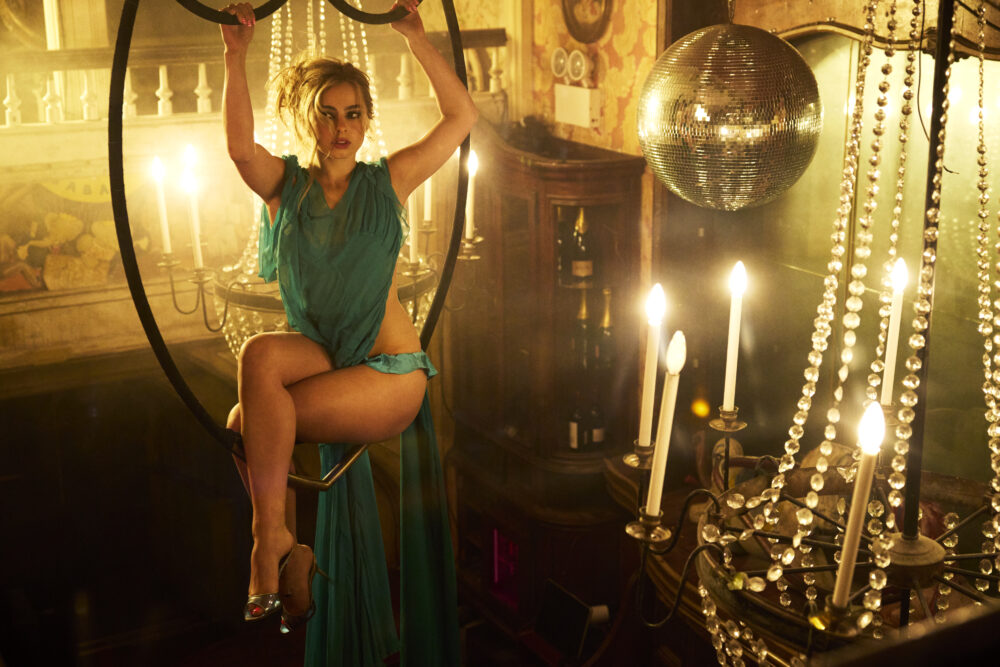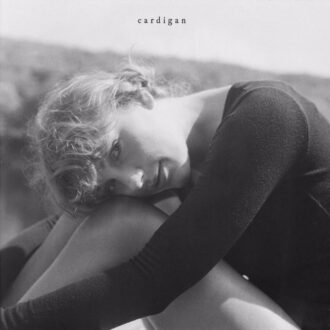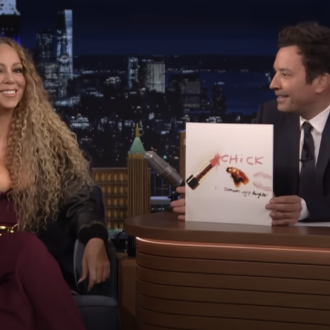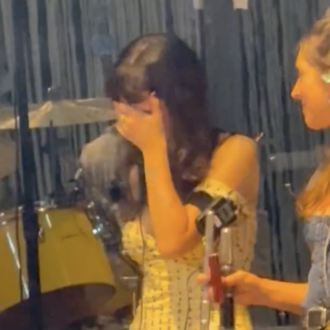Addison Rae’s Debut Album Is Surprisingly Good, But Something Is Missing

Ethan James Green
TikTok influencer turned pop star Addison Rae’s Addison might be the most surprisingly good pop album of the year. Really! This is one of those situations you get into as a pop music fan that, objectively, is not even close to being a hardship, but still feels hard. Sometimes you must speak your inner truth, like “the new Addison Rae album is good,” and then try to figure out how big an asterisk your inner truth wants to put on that.
For those of you who have somehow missed Addison’s curiously quick rise to pop cred, here’s a quick primer. Born Addison Rae Easterling, she had a similar childhood to Britney Spears, growing up in the South to parents with both a tumultuous marriage and a desire to live vicariously through their daughter’s talent. Like Britney, Addison started dancing at a young age and soon realized that this could be her ticket to the other LA. That’s where the similarities end. Spears was thrown into the industry machine as a preteen, appearing on national TV with The Mickey Mouse Club and Star Search. Addison Rae also performed to national audiences, but through the more self-directed medium of TikTok. “Self-directed” has a dark side too, though. Like Alex Warren, Addison was a founding member of the Hype House influencer collective, and like Warren, she internalized the group’s merciless mandate to grind. After moving to Los Angeles, as she told Rolling Stone, the career anxieties kicked in: “I have to start acting classes. I have to start singing. I have to start these things immediately, because I’m already so behind.” She was 19.
By 2021, Addison had caught up on her triple-threat lessons enough to release a debut single, “Obsessed.” The single flopped: proof that even the best-connected songwriting, producing, and publicizing team can’t help you if your song has no hook. Her subsequent EP, AR, was equally directionless and oddly dated, recycling decades-old Max Martin on “I Got It Bad” and exhuming an ancient Lady Gaga demo “Nothing On (But The Radio).” Acting wasn’t going much better. He’s All That, a Netflix-slop remake of ’90s teen romcom She’s All That, also flopped. Her big viral moment was the backlash to an ill-advised segment on The Tonight Show where she demonstrated — “performed” isn’t quite the right word — a series of TikTok dances, primarily by uncredited and unpaid Black creators. Throughout all this, her parents had ridden Addison’s coattails to become TikTok dancers and minor influencers themselves. This meant that when their marriage fell apart (again), and the sordid details of their divorce were sucked into a tornado of influencer drama that spiraled through alleged affairs, Zuckerberg-esque challenges to boxing matches, and the machinations of MILF-loving rapper Yung Gravy. Addison unfollowed her parents during all this. I don’t blame her.
Addison emerged from the media muck not just unscathed but transformed. Between albums, she met it girl Charli XCX, who adopted her as a pop protegee and put her on the Brat remix album. The next months put Addison through something like a finishing school for tastemakers. Her sphere of collaborators expanded to include the outre likes of producer Arca. Her singles grew successively more polished and ambitious; her fanbase grew successively less ironic. Her releases became statements. The cover of Addison is styled like a festival snapshot from mid-2010s Tumblr, with a font that evokes the early-’90s whimsigoth designs of album-art typography queen Margo Chase. The music, too, evokes the ’90s; pop-house and downtempo at its most lushly sophisticated, with nostalgia-baity Korg M1 synth arrangements, wistful chords, and meticulous production details. Addison’s vocals are close-miked to an almost ASMR degree, then put through unfathomable rounds of post-processing yassification so her soprano sounds immaculately crystalline. In an alternate universe, she could be a decent trance vocalist.
Lana Del Rey is a sometime influence, on breathy Born To Die dupes “Diet Pepsi” and “Summer Forever.” Charli’s influence comes out occasionally too. “Fame Is A Gun” comes from the same titling school as “sympathy is a knife,” and the tense, uptempo instrumental is a toned-down version of Charli’s hyperpop, as if Addison threw an Instagram filter on the Brat green. But what Addison doesn’t have is brat-summer hedonism. Instead of sex and drugs, the album offers a world where everyone is beautiful but no one is horny, where the only debauchery is the secondhand suggestion of the drugs from the chillout room. Her vice of choice is style; as she sings on “High Fashion,” “I’m not an easy fuck, but when it comes to shoes I’ll be a slut.” Like most of Addison, it sounds great.
Addison has so much style, coming at you so suddenly, that it raises questions about substance: Where did this even come from, and how much was Addison involved? On AR, Addison described herself as a “visual producer”; she’d offer her collaborators input like “I feel like there needs to be a double here or a triple here or something here.” (I don’t know what that means either.) Most of the Addison tracks began as moodboards, and she got signed to Columbia Records not with a demo tape but with a vibes-based PowerPoint. But during album promo, she also highlighted her GarageBand tinkering and her music-theory lessons, and did press spots poring over audio tracks with her production team.
It’s a savvy performance of authenticity. The general playlist-listening public is as happy as ever to give manufactured pop music unengaged streams. But when it comes to future pop stars — the sort of artists that people actively stan — listeners have far higher standards than they did a decade or two ago. Artists are expected to write their own music — increasingly, to help produce it as well — and to prove it, too. Their material looks different, too. Debut pop albums used to be the work of dozens of collaborators, as if the artist was selecting the finest musical wares the songwriting camps had to offer — but that’s much more believable from Beyoncé’s Renaissance than from an early-20s rando. These days, there’s more prestige in a different model, codified by Lady Gaga and perfected by Olivia Rodrigo and Chappell Roan: launching one’s career with a close group of collaborators.
On Addison, that’s Swedish producers Elvira Anderfjärd and Luka Kloser of megaproducer Max Martin’s MXM Studios. They’re both women, making Addison the rare mainstream pop album whose major personnel are all female — even the presence of female producers is uncommon in the industry. They’re also relative unknowns, and their back catalog yields few clues to where the album’s sound came from. Anderfjärd joined MXM before Kloser, and went moderately viral with her “dancing witch” remix of Taylor Swift’s “willow,” an attempt to make the evermore track spooky by adding a light snap-ish beat. Kloser, a former Eurovision contestant for Luxembourg, released the euphoric Moonfall soundtrack cut “One More Time” and the garage-inflected “Stuck” before moving into production-for-hire as well. The two have dozens more songs between them, including several bops — New Zealand up-and-comer Benee’s driving electro track “Green Honda” is a standout — alongside a great deal of slop.
But neither producer has what you’d call a signature sound. The fact that a signature sound emerged only after adding Addison to the mix suggests that she contributed something, if only creative control. That sound is far from unique, though; it borrows from several undeniably more auteurist artists. The self-aware frivolity and lightweight vocals are like a less frisky Kylie, or possibly Annie (Anniemal in attitude, Dark Hearts in sound). The rarefied club-lounge atmosphere reminds me of FKA twigs’ Caprisongs pop turn. And the specific trance-pop choices suggest an influence that musicians don’t really admit to anymore: Grimes circa “REALiTi.” (Addison Rae: the Bluesky to Grimes’ X?)
What I don’t hear is the album Addison and her team were actually influenced by: Madonna’s Ray Of Light. Madonna is a scrappier and more assertive vocalist than Addison Rae; she almost never disappears into her own songs. You can vaguely hear “Skin” in “New York” or “Candy Perfume Girl” in “Headphones On.” But Madonna heightened urgency, with higher BPMs and a harder, Garbage-esque edge to the production, where Addison’s songs aim to pose perfectly and uninterruptedly at a distance. And Ray Of Light had another defining quality besides the electronica: a self-indulgent, vaguely Eastern spirituality Madonna insisted on making known. The most spirituality displayed in Addison’s career thus far was a microscandal where Christian influencers tried to cancel her over a Holy Trinity-emblazoned bikini.
These are creative differences, not differences in quality, and certainly not differences in judgment; I don’t want to hear Addison Rae talking about the “indisputable truths” connecting the spiritualities of the world. But by invoking Ray Of Light, Addison and her team have inadvertently hinted at what’s missing here. The big moment in “Ray Of Light” is one line on the bridge, which Madonna repeatedly and euphorically beams into the world: “And I feel!” Addison Rae undoubtedly also feels too, but based on her album, you wouldn’t necessarily know that. Despite all the breathy contentment and summer-love nostalgia of “Diet Pepsi,” not once on the song does Addison directly express an emotion. The closest she comes is basking in the compliments her beau gives her, her image mirrored back at her: “My cheeks are red like cherries in the spring/ Body’s a work of art you’d die to see.” “Headphones On” is even more representative: a song that briefly acknowledges her hardships — “Wish my mom and dad could’ve been in love” — only to suffocate them in a narcotic musical bubble.
Addison Rae is self-aware enough to know this. After confiding to Max Martin that she struggled with being vulnerable as a songwriter, he told her: “The only way you’re going to really push yourself [is] to say things that are true and real. Once you spill it out, you can always take it down, but if you start shallow, it’s hard to bump it up.” This is a rare glimpse of songwriting philosophy from the notoriously reclusive producer, and it’s a little odd coming from someone whose best-known lyrical contribution to pop music is “now that I’ve become who I really are.” But it’s really good advice — advice that Addison in particular would do well to internalize. For now, though, she’s got a solid, occasionally gorgeous debut that’s refined shallowness to an art form. It’s not that deep.
POP TEN
Mariah Carey - "Type Dangerous"
She’s still got it. Mariah’s clearly been watching Doechii and SZA take boom-bap and noir Tarantino-heroine drama respectively up the charts, and she wants in. She’s also clearly noted the void on the radio where a summer jam should go. So she teams up with Anderson .Paak — apparently they may be dating? — samples Eric B. and Rakim, and comes out with her most commanding track in years. Her braggadocio and her way with words are still impeccable — “I don’t have time for the rigmarole” in particular has that ineffable Mariah quality. This should become inescapable.
Sabrina Carpenter - "Manchild"
There is some discourse about Sabrina Carpenter! It’s annoying! We’re not going to cover it here!
There’s also a song, and a pretty good one. There’s a fair amount of Dolly Parton here, particularly in Sabrina’s high-pitched twang; there’s even more Chappell Roan. The track is produced by Jack Antonoff at his most chameleonic, and like seemingly every other pop song these days, his arrangement has the same gentle chug as “Good Luck, Babe!” The concept, and especially the spoken-word interludes, evoke a heteropessimistic “Femininomenon.” Even the promotional campaign, a series of cryptic billboards on the highway, is out of the same viral playbook as “The Giver.” Sabrina’s wit, her best quality, is on display here too, but the best lines — “I choose to blame your mom,” “I like my men incompetent” — are toned down from Short ‘n’ Sweet. Though it debuted at #1, “Manchild” feels like a testing-the-waters single that comes before a big hit. Hopefully that superior song is still forthcoming.
Teyana Taylor - "Long Time"
Teyana Taylor’s upcoming album Escape Room, based on initial returns, already sounds like it’s going to be in album-of-the-year contention. This is an ambitious multi-part suite of an R&B comeback, gorgeously choreographed and costumed and art-directed. “Long Time” is vicious: a minimalist, ominous beat, menacing alto vocals, euphoric cut-up vocals, and seething contempt aimed at an ex I truly don’t envy. “Long Time” is sinuous and opulent and seductive: less of an immediate hit than part one, but also sounds like a grower.
Twenty One Pilots - "The Contract"
Breakbeats, blown-out vocals, pianos, and paranoia. I wasn’t sure what I wanted out of a Twenty One Pilots comeback, but I think this might be pretty close to exactly it.
Kehlani - "Folded"
Doesn’t quite reach the heights of “After Hours” — those are high heights to reach — but is a refreshing bit of midtempo throwback R&B. Kehlani fills every moment of her vocal with melismatic runs, like they’re singlehandedly trying to keep the tradition alive.
Seventeen - "Thunder"
K-pop boy band Seventeen cranks up every mid-2010s EDM knob at once: an insistent sequencer hook and whistles and accelerating percussion on the drop. The result: a single that sounds huge, but where all those production tricks cancel out everything that might have made them annoying in isolation.
Calum Hood - "Call Me When You Know Better"
I’d forgotten about the existence of pop-punk boy band 5 Seconds Of Summer, which meant I missed the moment when Calum Hood turned into Brandon Flowers. He’s not the only artist doing this right now, but “Call Me When You Know Better” has the melodies and tremendously high energy. The percussion is double-time but sounds like quadruple.
Sofía Reyes, Luísa Sonza, & RaiNao - "MiuMiu"
Mexican singer Reyes takes turns with Brazilian artist Sonza and Puerto Rican multi-hyphenate MiuMiu for this frenetic, bassy, constantly-morphing, attention-grabbing single, which sounds like three star turns at once.
The Favors (FINNEAS & Ashe) - "The Little Mess You Made"
And here I thought Debbii Dawson’s singles were the most ABBA-esque thing I’d hear all year; this shamelessly bites “The Winner Takes It All.” But I’m an ABBA stan, and “The Winner Takes It All” is a great song. Finneas’s theater-kid tendencies combine with Ashe’s showy vocal for an excess of stagey sentimentality — but that, too, is true to the ABBA I know.
Fujii Kaze - "Hachikō"
Fujii Kaze, a Japanese singer-songwriter and purveyor of immaculate grooves like 2022’s “Matsuri,” delivers again. “Hachikō” is neo-disco in the Jessie Ware style: little beatboxing, a little vocal fry, a lot of disco string hits, and immaculate atmosphere.



